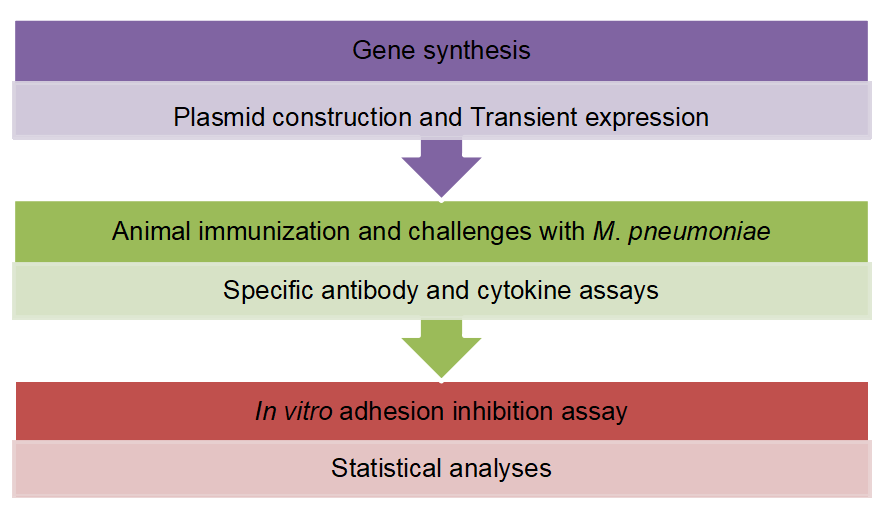Mycoplasma pneumoniae Vaccines
Although antibiotics play an important role in the treatment of bacterial diseases, the increasing prevalence of macrolide-resistant strains of Mycoplasma pneumoniae increases the risk of reinfection. Control of Mycoplasma pneumoniae may depend on the development of an effective vaccine that provides cross-protection between strains of Mycoplasma pneumoniae.
Mycoplasma pneumoniae
The cell wall-free Mycoplasma pneumoniae (M. pneumoniae) is one of the most common respiratory diseases in humans. M. pneumoniae is an important cause of atypical pneumonia and is responsible for other respiratory infections such as tracheobronchitis, bronchiolitis, croup, and less severe upper respiratory tract infections in older children and young adults. The genome of M. pneumoniae is small, only about 816 kilobase pairs, which accounts for its limited biosynthetic capacity and slow replication rate. Therefore, a major obstacle to understanding the pathogenic effects of this organism is the lack of knowledge of its biological properties due to the difficulties associated with the cultivation of this organism.
Vaccines for Mycoplasma pneumoniae
The efforts to develop effective and safe vaccines against M. pneumoniae are not satisfactory. Cellular extract vaccines, inactivated vaccines, and live vaccines of M. pneumoniae have been extensively studied. However, these vaccines do not distinguish between protective and harmful immunogens, and the protective effects are not very good. DNA vaccines can trigger humoral and cell-mediated immune responses. DNA vaccines vaccinated by intramuscular or intradermal routes can induce antibody levels up to 1,000 fold higher compared to immunization with protein vaccine. Therefore, DNA vaccines can be developed to control M. pneumoniae infection.
The P1 protein (approximately 170 kDa) of M. pneumoniae has been identified as the primary adhesion factor mediating attachment of M. pneumoniae to respiratory epithelium. The P1 protein can induce a specific proliferative response of lymphocytes and produce a preventive effect against pneumonia and can be used in a candidate vaccine to control M. pneumoniae infection. The adhesion protein P1, considered to be a potent immunogen, result in (i) high titers of specific antibody in the serum of patients with acute M. pneumoniae infection and (ii) strong antigenicity and adhesion activity in the carboxy-terminal region. The P1 protein is conserved between subtypes 1 and 2 and produces a protective immune response against M. pneumoniae infection.
Adjuvants
When M. pneumoniae replicates or invades the mucosal surface, the efficacy of vaccines against M. pneumoniae can be enhanced by inducing systemic and mucosal immune responses. Mucosal adjuvants can increase the protective response of the vaccine. The Escherichia coli heat labile toxin B subunit (LTB) may be an effective mucosal adjuvant that enhances the amount of antigen delivered to mucosa-associated lymphoid tissue inductive sites and subsequent upregulating stimulation of antigen-specific B- and T-lymphocytes by increasing the uptake of LTB-conjugated antigen. In addition, LTB showed a low potential to trigger an allergic reaction compared to other mucosal adjuvants.
Our Workflow for Mycoplasma pneumoniae Vaccines

With the help of our well-established technology and experienced scientists, Creative Biolabs strictly controls every detail of the vaccine development process, including adjuvant selection, sterility testing, vaccine storage, etc., to provide the best quality service at every stage. If you need professional, reliable and quality services, please entrust our professional team to provide the best workflow choice for your research goals.
All of our products can only be used for research purposes. These vaccine ingredients CANNOT be used directly on humans or animals.


